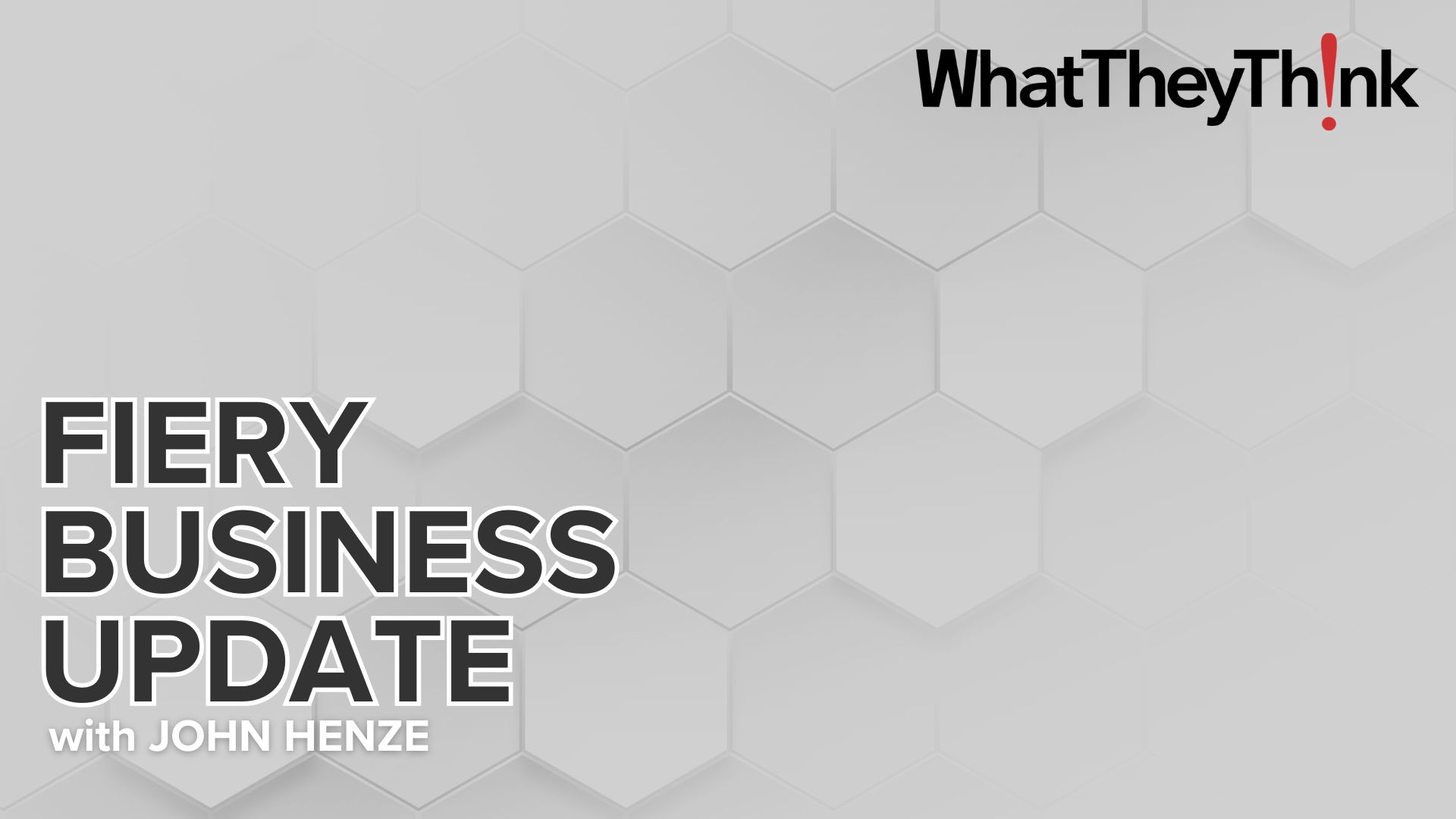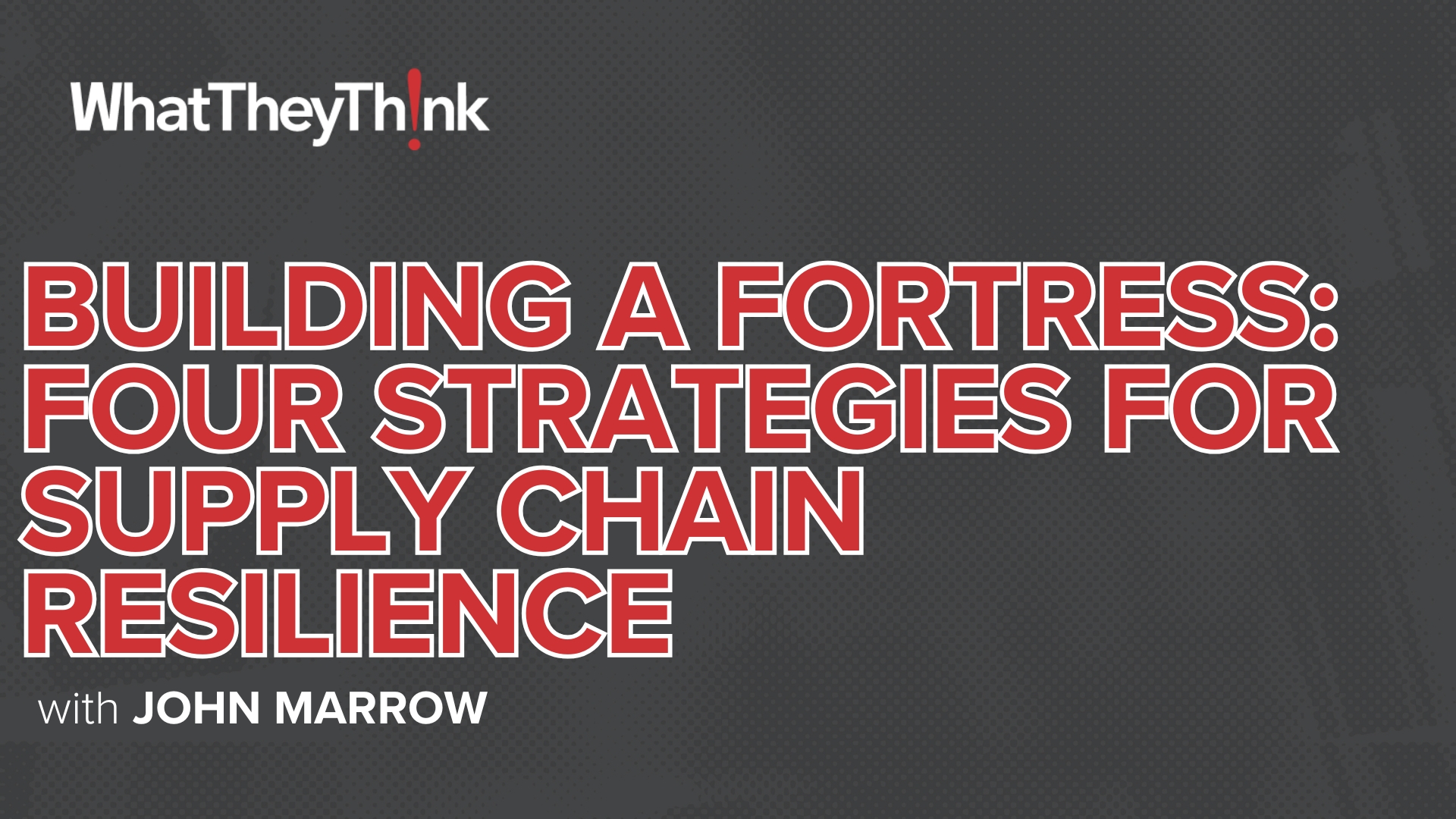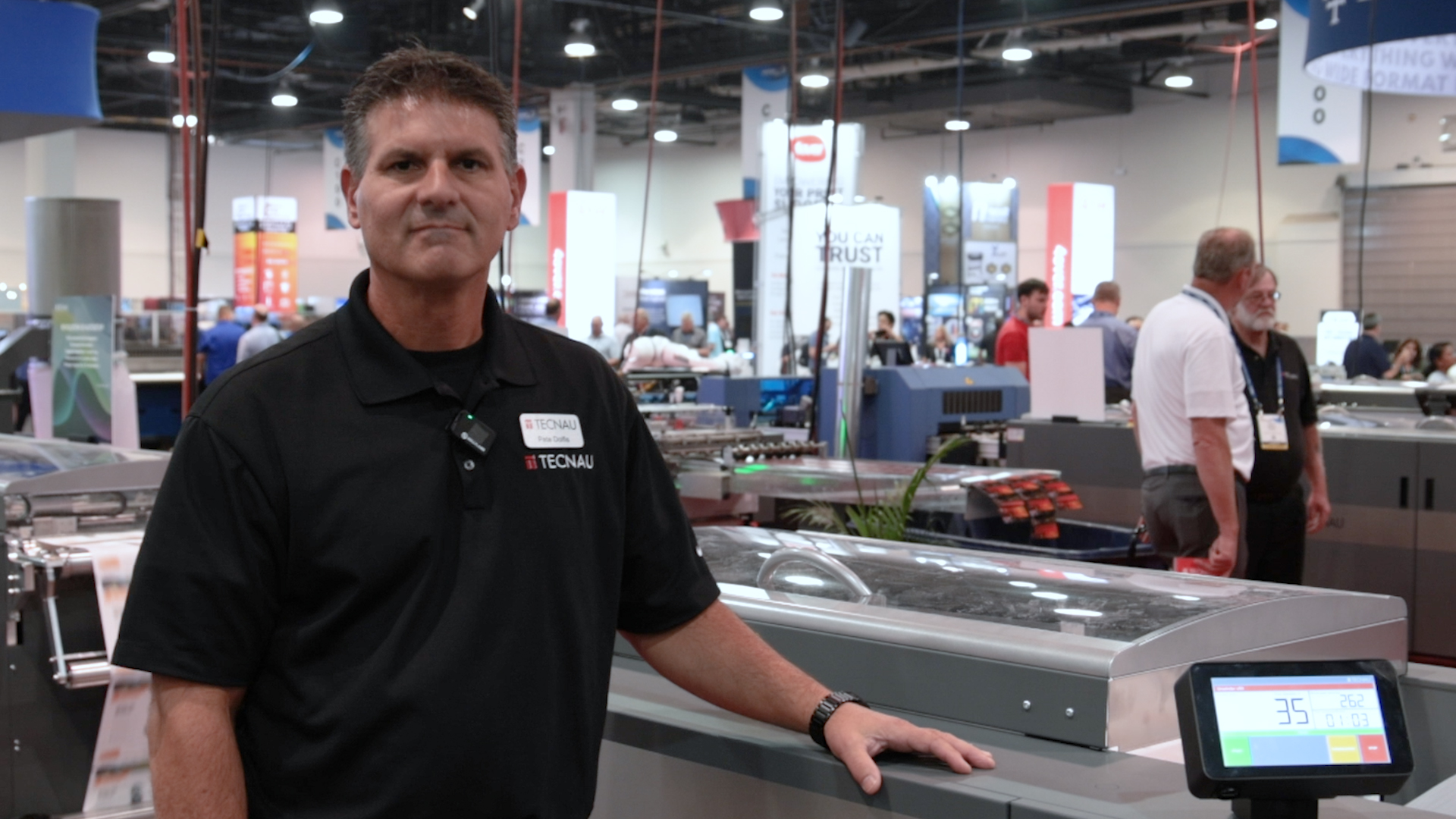Commentary & Analysis
Displaying 4551-4650 of thousands of articles
Insight You Need. Analysis You Trust.
Get the trusted insights you need to understand our evolving industry and emerging trends. Become a Premium Member.
Paper Industry “Unfolds” Deep-Pocketed Image Campaign to Halt Slide in Demand
Paper suppliers have made an all-out commitment to putting a floor under the declining use of their products—including levying a volume-based fee on themselves to pay for the effort.
Sustainability Reality Check: It’s a Journey, Not a Destination
What is the difference between a “green” business and a “sustainable” one? What are some unique approaches to the concept of sustainability that printing companies—large- and small-format—are taking? In the end, it’s not just about making the company sustainable, but rather the entire supply chain.
How Have Big Metro Area Printing Establishments Fared in the Recovery?
Dr Joe took a look at how the number of commercial printing establishments in New York, Los Angeles, Chicago, DC, and San Francisco metropolitan areas has changed since 2010.
The Power of Personalization: Get Data and Get Going!
Today’s marketers are seeking partners that can help them deliver the right message at the right time, while also delivering the most effective data strategies to ensure that offers are not dead on arrival. This article explores how print service providers can capitalize on this opportunity by building data expertise.
Year-to-Year Real Retail Sales Peaked in January, and Are Weaker Since
June retail sales adjusted for inflation fell -0.6% compared to May. Month-to-month changes are somewhat volatile, so it's better to look at the comparisons to the prior year. The chart shows that June retail sales were +1.2% compared to last year, the worst comparison since March 2014. There are signs that the economy is slowing again. In the first quarter, real retail sales were +2.6% compared to the prior year, but this second quarter is only +1.6%. The economy always has conflicting positive and negative data, but this downturn in a key sector of the economy is likely to raise some eyebrows among economists and policymakers.
The Fear of Launching Print Software
Launching any new print software technology can feel risky. With the rate of change in both our businesses and software technology, we have to create a culture that is comfortable with launching early and iterating through issues. It is impossible to predict every possible scenario; it is liberating to accept that finding issues post-launch is part of the plan.
Yes We “Can,” and Do, Says New Promo Campaign for Aluminum Containers
“Open Up to Cans” is what consumers are being urged to do by a can makers’ trade association. But, when it come to beverages, most already have.
Is Small Business Slowing Down Again?
The NFIB Small Business Index was released this week, “The weakness was substantial across the board, showing no signs of a growth spurt in the near future,” according to Bill Dunkelberg, NFIB Chief Economist. “Declines in spending plans accounted for 30 percent of the Index decline, and weaker expectations for real sales and business conditions another 20 percent. The deterioration in earnings trends accounted for about a quarter of the decline.”
Refining Packaging Cycle Time: The “Last Mile” Power of Digital
Packaging is one area of the printing industry where growth continues. But it is not without its challenges. Learn how leading packaging converters are leveraging digital technology to address time-to-market challenges and developing new revenue streams in this article sponsored by Highcon.
2015: The Current State of the Industrial Printing Community
SGIA’s Dan Marx shares some of his organization’s most recent research on industrial printing. What technologies are companies in the industrial printing space using? What products and technologies have they been investing in? Where do they see the most (and least) growth opportunities? What is their business outlook?
Two Keys to Increasing Productivity: Software Automation and Hardware Utilization
One of the keys to effectively running a world-class company is finding ways to constantly increase productivity. This article explores the importance of measuring operational performance and discusses various strategies for doing so.
Print Software as an Infrastructure Investment
Print software is an infrastructure investment in our increasing online and digital economy. Adopting a strategic infrastructure approach to investing in and implementing print software will be a key differentiator for print businesses moving forward.
Interview with EFI's Udi Arieli on FedEx Office's Use of EFI Workflow and Productivity Technology
Yesterday, EFI and FedEx Office announced that FedEx Office is using EFI products for a more cost-effective and streamlined delivery of professional print services. I spoke to Udi Arieli, EFI’s Director, High End Market Business Development, EFI Productivity Software, to get the scoop for this WhatTheyThink exclusive.
Fortis Solutions Group Grows by Acquisition and by Technical Leaps and Bounds
An investment banker turned label printer is building a network with a widening geographic reach and a deepening capability in flexo and digital production.
Cloak and Dagger Inks Fight Counterfeiters – June 2015 M&A Activity
Analysis of June 2015 Mergers, Acquisitions & Restructuring in the Printing, Packaging & Related Industries
The Great, Outdoors: Attention to Detail Goes a Long Way Toward Creating Effective Outdoor Graphics
New applications for outdoor graphics are appearing all the time, and new printing technologies are revitalizing some older applications. Some considerations if you are looking at outdoor graphics, and a look at one South Florida shop that has carved out a niche in the great outdoors.
Cross-Media? Multi-Channel? Omni-Channel?
UK-based Blackdog Digital is a terrific example of a company that has morphed from being a commercial printer to a digital printer to a variable data printer to a full-service provider of cross-media campaigns. Blackdog’s Phil Copperwheat shares his thoughts on the company’s transformation and what other companies need to do to get in the cross-media game.
Inflation-adjusted US Commercial Printing Shipments Better than 2014
Commercial printing shipments have been much higher than they are in today's market, but the bounce off the lows of 2014 this year have been notable. The comparisons toward the end of 2015 will be harder to top since the industry started to show this bounceback at the end of 2014. The transformation of commercial printing businesses has been an arduous one, with volume declines of many mainstream products, but a rise in specialty applications. Those new applications are often based in digital printing, such as wide format specialties. There's also a new generation of print business managers who are not burdened by the myopia of history, where print was paramount. These executives and owners have grown up with computers and gadgets and have a better sense of print's new role in media communications
Two Sides North America Defends Paper and Print on Many Fronts
Corporate promulgators of spurious “green” claims that disrespect printing, be warned: a riposte and a recantation may be in your future.
OneTouchPoint: Delivering on the Promise of Customer Intimacy
Without leaving their homes or offices, individuals can assess and evaluate an array of products and services. The most successful firms understand that the lifetime value of a customer is more important than the value of the initial transaction. This article explores how Kohler Co. partnered with OneTouch Point to stand out from the competition and maximize the value of long-term customer relationships.
Technical Staffing for Printers – Top 3 Characteristics
Staffing your technology is as important as staffing your presses. The top characteristics for good technical resources: understand the limits of your knowledge, resist making assumptions, and see opportunities rather than roadblocks.
Not with A Pop, but A Whimper
What would Bubble Wrap be without poppability? Alas, we are about to find out.
Getting to Know HP’s Eric Wiesner
As our readers may know, Aurelio Maruggi led the InkJet High-speed Production Solutions (IHPS) division at HP since its inception and has recently moved to a new role within HP. He spent a lot of time with customers and really understood the business and their needs. His successor, Eric Wiesner, has a very different background, but one that is equally valuable to HP and customers alike. I had the chance to speak with him recently about his background and his thoughts about the future.
Business Success Is All in the Family at Prystup Packaging Products
This privately owned folding carton company follows a straight line from its family values to its strategies for business growth.
The Next Wave of Digital Publishing: Employee Engagement
We’ve been writing about the adoption of digital publishing tools for publishing and sales enablement. The next wave for this discipline is a natural: employee engagement. We spoke with Douglas Fajardo, CEO of Mirum Miami, an agency working with Sony Latin America, about the impact Sony’s employee engagement app is having on its employee on-boarding process.
Selling Print to an Informed and Predominately Online Buyer
As the online world continues to expand, your prospects and customers can become more educated buyers. Your response to this is to invest in your online presence so that first impressions count.
Conferees Roll Up Sleeves for Close Look at Growth of Sleeve Labeling Market
Sleeves are coming on strong as labeling options as numerous technological advances make them more attractive to work with. A recent event in Florida covered some of the most important ones.
EPS Doublet Brings Amazing Innovation to Experiential Marketing with Production Inkjet
Colorado-based EPS Doublet creates amazing event experiences for its many marquis customers and is an expert in experiential marketing. See how the company leverages large- and small-format digital printing to bring innovative solutions to its customers in this article sponsored by HP Graphics Solutions Business.
The Big Wide Word: Marketing Tips for Wide-Format Shops
OK, so you’ve invested in wide-format printing capabilities, the equipment is up and running, the staff is trained, and you’re ready to RIP. How do you get work to run on that equipment?
What’s Your Digital Quotient?
According to McKinsey & Company, following the leader can be dangerous to your future profitability. This article explores four steps for optimizing performance in today’s digital world, and also discusses the importance of developing a digital quotient.
Interest Rates Have Rising Since the End of 2011
We all know how the markets seem to panic when the Fed hints that rates will be rising soon, but they already have. That is, the markets have been pushing up the inflation-adjusted 10-year US Treasury since September 2011 by 420 basis points (4.2 percentage points). The rate is now the highest since June 2010, at 2.33%. This measure can be volatile because of the inflation adjustment. We used the year-to-year inflation rate as measured by the Consumer Price Index for that reason. There are Fed governors who believe that they have great latitude to be patient with a rise in inflation since their target of +2% annual inflation has not been met. This means that they believe they have a cushion of “banked” uncreated inflation that they can use up before they move aggressively. Whatever the case, a 25 basis point rise in short term rates is not much, as they might actually be catching up to the marketplace that has already moved and the Fed is already lagging well behind it. They miss an important point. The CPI does not measure inflation in a practical way. If wages are stagnant (though a little better lately), a “mild” 2% rise can be a burden. Median household income is still 4% lower than its peak just after the recession started. A 2% rise in inflation plus the 4% lower income is a 6% difference. That's something that's rarely mentioned in the business press.
Printers 5 Top Challenges with Print Software
Software is mission critical to your business, like other infrastructure investments it takes time and effort to make the best decisions, plan to get the most ROI, and continue to build differentiation in the marketplace. Optimizing your print software investments comes with challenges which every printer faces in order to compete in an increasingly online, digital world.
“Cluster” of Companies Aims to Stimulate Papermaking Industry in the Bay State
There’s strength in numbers—and in “clusters” of businesses like the ones that have come together to reinvigorate paper manufacturing in Massachusetts.
CxF3 and Color Management – exciting things to come
In this article, David Zwang looks at the evolution of Color Management in light of the recent approval of CxF3 as a standard by the ISO, what exciting new things it can bring to the process of Color Management in design and production, and what the future holds.
EskoWorld 2015: Dreams for Tomorrow
The community of U.S. Esko users descended upon the Fairmont Scottsdale Princess in Arizona earlier this week to sharpen their skills, answer questions, get product roadmaps, and network with Esko executives and engineers as well as a diverse group of their peers.
Ad Agency Revenues Still on the Rise, Up 40% Since Start of Recovery
Since the start of the recovery all the way back in mid-2009, advertising agency revenues have increased by +$32 billion, +40% since that time. There are many economic indicators that have never recovered (such as full time jobs) but ad agency revenues have blown through the pre-recession high of $91 billion and is now running at the rate of $112 billion annually. The agencies have had this performance because they are immersed in the media upheaval, riding and stoking the changes in communications formats on behalf of their clients. Wages have followed this shift in media, and has been documented by us before. The average public relations pay is about $10,000 more than the averaged of all agency wages. Book publishing industry revenues have stabilized, and trends of newspaper and periodical publishing revenues are still down, but at a lesser rate.
Signs and Wonders: Digital Begins to Transform Indoor and Outdoor Displays
Smart screens that look back at their onlookers are only the beginning of the changes that digital technology will bring to signage and display markets that used to belong to—but now must be shared by—conventional print.
Web-to-Print Differences: In-Plants vs. Commercial Printers
InfoTrends’ research has uncovered some key differences in web-to-print adoption among commercial printers versus corporate in-plants. This article leverages recent research to explore some of the differences in how these two groups use web-to-print technology.
Online Print Marketing: Optimizing for Two Audiences
Inbound marketing is the strategy of choice for online marketing, content is the main ingredient to any successful inbound marketing strategy. Your content has to be optimized for two audiences; your target customers and the search engines.
Man of Letters: Hermann Zapf and the Art of Packaging Typography
Typography for packaging design will never be the same after Hermann Zapf—and always will be.
Sew What? The New Skill Sets for Wide-Format
Printing is easy; it’s all the other stuff that can pose challenges. Producing wide-format output can require a different approach to traditional processes, from selling, to finishing, to transporting. What do you need to know before you take the plunge?
May 2015 – Mergers, Acquisitions & Restructuring in the Printing, Packaging & Related Industries
De-evolution for eBooks Platform? – May 2015 M&A Activity, includes commercial printing, packaging, newspapers, and equipment.
Anti-Counterfeiting Technologies Tell Packaging Knock-Offs To Knock It Off
In a perfect world, food and beverage producers wouldn't have to spend billions to protect themselves against bogus packaging. But, at least they have effective ways to spend the money.
The Dscoop Community Tradition Continues: Dscoop Open in Dublin, Ireland
At the Dscoop Open event (June 3-5 at the Convention Center in Dublin, Ireland), solutions partners shared their perspectives on how to make a “hole in one” with digital printing. This article provides a brief overview of the event’s highlights.
Latest Employment Data in Printing and Content Creation Markets
In spite of recent strength in US commercial printing industry shipments, employment is still on a downward path. The industry seems to becoming more efficient, somewhat from better management, and somewhat from consolidation as weak establishments are aborbed or exit the market. Compared to April, however, the Bureau of Labor statistics estimates that employment increased by about 600, which is common compared for May in recent years. The April public relations employment was very strong compared to the prior year and is up +8.8%. When PR employment is excluded from ad agency employment, the number of employees in agencies is still up +2.1%. The employment data have always reflected the changes in the media market as well as the strength in the economy. Though the economy is slow, advertising agencies have reinvented themselves and are very active in social media and digital media production.
Revised Commerce Department Data Sends Forecasts in Opposite Directions: Will US Printing in 2020 be $90 Billion or $27 Billion?
Data for the end of 2012 and the beginning of 2013 were revised to a slight rise in shipments when the original data showed a steady and significant decline. That period of mild increase was followed by a period of decline that was smaller in magnitude than originally reported.
Accu-Label Enters the Digital Market at a Pace That Wastes No Time
A rapid changeover from conventional to digital production was both the cause and the result of the installation of digital printing equipment at Accu-Label Inc.
Magic Bus
If you happen to have been in Singapore recently—and who of us hasn’t?—you may have caught sight of a new wide-format backlit film that can be used for vehicle graphics. Called eLumiNEX, it has been given a shakedown cruise on a bus.
The Current State of the Graphics & Sign Industry
SGIA’s Dan Marx shares highlights from the 2015 SGIA Specialty Imaging Industry Survey. What equipment is hot? What products are on the rise, and which are on the decline? In what verticals are the hot prospects? And what is the overall market outlook for the wide-format and specialty graphics industry?
Next-Stage Growth Was Front-of-Mind at Digital Print for Packaging Conference
Digital printing for packaging has room to grow and the means to achieve that growth. There was plenty of room for discussion about making it happen at a recent symposium of experts in Tampa.
10 of 11 Months of Increased Inflation-Adjusted US Commercial Printing Shipments
This chart shows how the US commercial printing shipments have been better compared to the prior year for the last 11 months of reporting by the Commerce Department. What's it mean? We're still averaging $400 million per month less than a similar period in 2010-2011, and we're well below the levels of ten years ago by about -$2.8 billion per month. The recent stability may be the result of several factors. First, weak companies are gone as a result of closures and consoPrinting Shipments Rising, Best April Since 2010lidations, leaving companies that know what modern print users need. Second, there has been a generational change in management to owners and executives who are more comfortable with digital technology because they have always used it, growing up with cell phones, video games, and computers everywhere. Third, the big targets for displacement by digital media have been pulverized, and what remains are specialties and applications more appropriate to a multichannel integrated media marketplace. Fourth, there a more companies using business development techniques (tell us about your target audience and how we can make your digital initiatives more effective) rather than old sales techniques (would you like to see my equipment list?). Then again, it could be the calm before another storm. New data networks are on their way, such as 5G, where two hour movies can be downloaded in six seconds rather than six minutes. Print has a good story to tell, but please, don't make it an old story. Print needs to be fresh and new. The market may be stable now, so use this time well to get ready for the market ahead.
The Stars Are Aligned for ANRO in Production Inkjet Printing
ANRO Communications is well-known in the printing community for its innovation and thought leadership position. In this article, sponsored by HP, Paul DeSantis, ANRO’s Director of IT, talks about how production inkjet has future-proofed the company’s business.
Top 5 Mistakes with Web-to-Print
Web-to-print is our term for moving customer engagement online. This represents a big change for most traditional business-to-business printers. This article describes the top five mistakes I see when working with printers through this transition from an offline business to an online / self-service customer interaction model.
Commerce Department Revises US Commercial Printing Shipments Data: Revises Shipments Higher for 2013 and 2014
Every May, the US Department of Commerce issues “benchmark” revisions to the manufacturing shipments data it reports. Every month, the shipments report is used by economists and analysts at Government agencies, such as the Treasury Department, but also by banks, businesses, and others, to identify strong and weak areas of the economy, and to forecast future economic conditions. The reports are based on a combination of actual and estimated data from economic models.
Today’s the Day: OSHA HCS Compliance Update
If you work with hazardous chemicals or other substances commonly used in printing operations, June 1, 2015, is the deadline for meeting new requirements to OSHA’s Hazard Communication Standard (HCS), in particular, new warning labels and Safety Data Sheets (SDS). Here’s what you need to know.
Paper Chase: Mcor Pursues 3D Printing Market with Ingredients That Every Printer Knows
Put ink on paper, and you have a print. Do the same thing as part of a process known as selective deposition lamination, and you can have a three-dimensional object in full, ICC-compliant color.
A Renewed Focus on Core Print Services and a Slowing PSP-to-MSP Migration
The transition from a Print Service Provider to a Marketing Service Provider has been a topic of discussion for several years now. Although some businesses are making this shift, others are placing a renewed focus on their core competencies. This article cites InfoTrends’ research and explores the challenges that can arise when attempting to make the transition to an MSP.
Microbusinesses Increasing as a Percentage of the Workforce
The Commerce Department released its “Nonemployer Statistics” data for 2013, showing that these businesses increased to 23 million since 2012, and by 30%, three times the rate of population growth, since 2002. Let's call them “microbusinesses.” They are now more than one in seven of the workforce.
The Custom Print Software Project
When you need a custom software solution, think about assembling a puzzle rather than building from scratch. The software landscape is full of integrate-able pieces that can give you ‘expected’ functionality so you can focus your custom development on what makes you ‘unique’.
The Pizza Box—Yes, the Pizza Box—Reimagined
When the moon hits your eye like a big pizza pie, it may be because someone has printed or drawn the moon (or another visually arresting image) on the box.
Two Paper Makers Forge Alliance for High-End Packaging
Trust, a handshake, and an eye on luxury packaging are behind the newly formed partnership between Mohawk and Arjowiggins Creative Papers.
No Letup in Experiments with E-Ink and E-Paper
If e-ink and e-paper haven’t yet taken the world of graphic communications by storm, that doesn’t necessarily mean they never will.
Cordoba Printing Brings Print On Demand to Israeli Publishers with Kodak PROSPER 1000
Adding production inkjet to its book printing operation is enabling Cordoba Printing & Binding of Israel to adjust to drastic changes in the Israeli book market as well as to pursue new business opportunities. Learn more in this article sponsored by Kodak.
Revised Annual US Commercial Printing Shipments Show Stability in Recent Years
Last week, the US Department of Commerce released its annual revisions to manufacturing shipments. Printing shipments estimates were increased a total of approximately $10 billion combined for 2013 and 2014. The data softened the decline in 2013 shipments by a considerable margin and also reaffirmed the recent rise in printing shipments over the last ten months. While shipments in 2014 were still below 2013 on an inflation-adjusted basis, the pattern of the last few years shows a decline in shipments that is more muted than the Commerce Department originally reported. Our advice is the same: this is breathing room that can be used for restructuring of print businesses with forward-looking strategies that can take advantage of the next waves of communications technologies, while implementing sales and marketing processes that are appropriate for the times ahead.
Has your Print MIS Estimating Fallen Apart?
Estimating is a core function for Print MIS software, yet many printers fail to implement this part of the system to a trusted level, hence there is a lot of retreating back to Excel. Estimating is a critical function that needs to be part of your integrated and measureable print management information system.
In Praise of Packaging Engineering, with Specimens that Speak for Themselves
In a package, you see the design, but you experience the engineering: the underlying combination of technical merits that make it practical to use as well as delightful to behold.
Challenges In Sizing the Sign and Display Market
By all accounts, the sign and display industry is growing by leaps and bounds. But getting accurate sizing data is fraught with difficulties—difficulties that have largely been caused by the very factors that are driving growth.
Why Can’t We All Be Employed by Employers Like Hammer Packaging ?
Rochester, NY, is distinguished for many things connected to the printing industry. Hammer Packaging is keeping that tradition alive in an exceptionally employee-friendly way.
Reinvention: Centered on the Customer
During the 2015 Inkjet Summit, service providers acknowledged that much of the innovation in their markets was done in collaboration with customers and driven by the dynamic changes in the clients’ specific businesses. This article explores how inkjet technology is delivering key advantages to transactional printing, direct mail marketing, and publication printing applications.
NAICS 323 US Commercial Printing Establishments
These data about US commercial printing establishments are from the newly released 2013 County Business Patterns published by the Bureau of Labor Statistics. At the turn of this century, there were nearly 38,000 establishments engaged in commercial printing and services; in 2013 there were nearly 27,000. These data do not include inplant printing departments or packaging, but do include label printers and trade services. An establishment is a separate location in a practical definition, and a firm can own more than one establishment. The number of establishments is in response to the size, scope, and nature of overall print demand, but there are other factors.
Latest Analysis of Employment and Retail Sales Data
Dr Joe. digs into the last 2015 GDP trends, last Friday's overall unemployment report, and US commercial printing employment.
Focus, Priorities: The Future of Your Print Business
Looking backwards won’t help you navigate the uncharted waters of the future. The print businesses of the future will adapt to remain relevant in a digital, online, and data-driven world.
Eeewww or Edible? Nanoscience May Have an Answer for Food Packaging
Deciding when packaged food has gone bad is a tough call that we often get wrong. At MIT, they’ve come up with a guesswork-eliminating solution.
Catching the Falling Knife versus Personal Branding – April 2015 M&A Activity
April 2015 –Mergers, Acquisitions & Restructuring in the Printing, Packaging & Related Industries
With Flexcel NX, Kodak Promises to Break New Ground in Flexo Print Quality and Efficiency
Can flexography do a better job with opaque whites, hard-to-hold details, and other hurdles for packaging printing with the process? Kodak says yes.
ISA 2015: Trends and Opportunities
InfoTrends’ Steve Urmano recaps the recent ISA Sign Expo with a rundown of some of the major product announcements, as well as a diverse array of other printing and finishing equipment on display.
First Quarter US Commercial Printing Shipments Up +3.5% Versus 2014
The last ten months of US commercial printing shipments have increased +3% compared to the same months of the prior years. For the first calendar quarter, shipments are up +3.5% compared to the same quarter of 2014. There has not been this kind of growth for about ten years. Please note, however, that the Commerce Department is revising at least three years of historical data next week; it's not possible to determine how the data will change. Assuming the pattern of these data remain the same, it's not a long term bottoming of the shipment level that will turn upward again. The march of digital technologies that offer alternatives to print will continue (read what 5G networks will bring in 2020, for example). It's more likely a pause that should be used to reposition well-running print businesses for the future, consider investing in capabilities and businesses that will take advantage of the new communications innovations ahead, and develop alliances with others whose talents will be needed to do so. This might be 2005-2007 playing out again for us. If your business is growing, don't rest on your laurels. Appreciate the flexibility your business has to prepare for the future and use the time wisely. Never hunker down and wait for things to play out.
Access Direct: Reinventing Business with Inkjet Technology
During the 2015 Inkjet Summit, a number of innovators acknowledged the need to leverage emerging technologies to profitably accelerate business growth. This article explores how Access Direct has reinvented itself as a leader in data management, variable messaging, and inkjet printing. It also demonstrates how Access Direct’s actions parallel the advice given in Josh Linkner’s book entitled The Road to Reinvention: How to Drive Disruption and Accelerate Transformation.
Organic Search Success and Duplicate Content
The internet search engines do not like duplicate content; in fact they rank your site lower if you are duplicating content from a site that clearly has the authority to that content.
Make Your Customers the Stars of Your Marketing
Your marketing should talk more about your customers than about you. Compelling marketing content is about telling customer success stories to teach and attract more customers who find your content relevant to their current challenges.
Xerox iGen 4 for Folding Cartons: An Update from Europe
If you don’t think of Xerox’s iGen4 as a packaging press, think again. In Europe, the platform is showing off what it can do in folding cartons for consumer-product and pharmaceutical applications.
PET Project: Label-less Labeling
Every beverage bottle must have a label to identify and brand the product—correct? Not necessarily, says the developer of a direct-printing alternative.
Point/Counterpoint: The Business Case For (and Against) Digital Signage
Dynamic digital signage is becoming a hotter and hotter topic, and while there are ample opportunities for companies to get in on, if not the ground floor, than at least the mezzanine, it’s not to everyone’s taste. Here are some arguments for—and against.
Q1-2015 GDP Disappoints at +0.2%; Will We Hear the “R” Word Soon?
The GDP estimate of Q1-2015 growth was at +0.2% when consensus was +1.0%. The estimate will be revised at the end of each of the next two months. That consensus estimate of professional economists has been revised down regularly since the beginning of the year, with many of the original estimates at +3% or higher.
Symeta: Selling Inkjet, Delivering Value
In what is perceived as a commodity-oriented marketplace, print sales reps struggle to maintain a proper balance between features and benefits. This article explores how Symeta (Brussels, Belgium) has transformed its business with strong sales and marketing and a value-based approach to communications.
Payroll per Employee for Commercial Printing and Content Creation Businesses
The 2013 County Business Patterns report was just released by the Bureau of Labor Statistics, one of the most valuable of all government economic reports. The data are based on Social Security tax filings made by employers. In this manner, the BLS can count the number of business establishments and the number of employees of those establishments with great accuracy from analysis from the mandatory filings of Form 941, submitted with company payroll taxes. As the data show, content creation businesses have much higher per employee annual salaries. This makes these industries very attractive to new employees, especially those starting their careers. The most interesting to me is the rise in public relations agencies. In the late 1980s, the payroll for ad agency workers was about one-third more than public relations. In 2005, they were about the same. In these 2013 data, PR employees are paid about one-eighth more.
Workflow— Reinventing PRINERGY 7 and Kodak
This article is a part of a series of articles by David L. Zwang that focuses on the processes and products that can lead to the transformation of your current workflows and business to prepare you for the new challenges ahead. In this article, Zwang looks at the release of PRINERGY 7, in the context of Kodak’s reinvention.
Growth Opportunities: A Conversation with SpeedPro Imaging President Boris Katsnelson
Founded 10 years ago, SpeedPro Imaging is a network of 120 franchises—or “studios”—located in 30 states that specialize in wide-format printing, from trade show and event graphics, to vehicle graphics, to wall murals, and beyond.
New Workflow Chief at Kodak
We recently learned that Kodak has hired a new workflow chief. Allan Brown, formerly with HP and Xerox, joined the company as General Manager of its Unified Workflow Solutions business. Read what Brown has to say about workflow and Kodak strategies moving forward.
“R&D” on a Digital Press Takes Premier Markings to the Next Level in Label Production
Established seven years ago, this small but visionary shop is a case study in the rise of digital technologies in the label printing segment.
HP Aims to Disrupt 3D Printing with Inkjet Solution Now on Way to Market
By adding a third dimension to what it already knows about inkjet printing in two, HP hopes to develop the fastest and most capable 3D printing solution yet seen.
Launching Additional Brands Online
What’s more costly, opening up a new successful retail location or a new successful online brand/store? The answer is “it depends”. Just because making a new e-commerce site is “cheap” doesn’t take into consideration all the costs of driving traffic and getting conversions.
Transformation: Are You Taking the Right Steps to Change?
Service providers of all sizes are constantly talking about the need to transform their businesses from commodity-oriented organizations to marketing and communication service specialists. A recent article from McKinsey & Company details six steps for driving revenue and margin improvements, and these steps are discussed in this piece.
Printing Prices Compared to General Inflation
The Bureau of Labor Statistics publishes many indexes of inflation, the best known of which is the Consumer Price Index. The BLS also publishes hundreds of other indexes in the Producer Price Index (PPI) series that track price changes in industries, products, and commodities. This week's chart shows the year-to-year change in CPI (orange line) and the PPI for printing (blue line) on a monthly basis for a little more than ten years. For most of that period, printing prices have lagged consumer prices, often by wide margins. Since December 2004, printing prices are up +14% while consumer prices are up +27%. That is, printing prices are increasing at about half the rate of consumer prices. Or, looked at differently, printing prices are about -10% less than the change in consumer prices: print is getting cheaper every day. But print owners and their workers cannot spend printing dollars when they go to the supermarket; they have to make up for the 10% shortfall in prices somehow. This is difficult since many of the prices printers need to pay for wages and materials more closely follow consumer prices. It's a double-edged problem: lower revenues, higher costs. Profit leaders have figured out how to survive in this environment as they still stand out from their peers. But these double-edged pressures have caused weak companies to leave or offer themselves as consolidation candidates.
Garbage In, Garbage Out, Good Accomplished
How an earth-friendly cleaning products company called method scours the ocean for plastic waste it can recycle into material for new containers.
Temporary Signage and “EMCs” Continue to Rile City Planners; What Aspiring Sign Shops Need to Know
There are growing opportunities for print service providers in signage—both printed and electronic—but it pays to do your homework when it comes to signage regulations.
Interview with Kevin Cushing on Alliance Franchise Brands, Franchising and More
Kevin Cushing, formerly CEO of AlphaGraphics, has accepted the position of President of the Marketing & Print Division of Alliance Franchise Brands LLC (parent company of Allegra Network LLC). Hear what he has to say about the company, franchising in general and the importance of a learning environment.
Sun Chemical Heads to INFO*FLEX with a Full Kit of Packaging Solutions
A vertically integrated ink manufacturer, Sun Chemical takes a concept-to-shelf approach to packaging with a broad range of products and services for printers and converters.
- Questions to ask about inkjet for corrugated packaging
- Can Chinese OEMs challenge Western manufacturers?
- The #1 Question When Selling Inkjet
- Integrator perspective on Konica Minolta printheads
- Surfing the Waves of Inkjet
- Kyocera Nixka talks inkjet integration trends
- B2B Customer Tours
- Keeping Inkjet Tickled Pink
© 2024 WhatTheyThink. All Rights Reserved.














